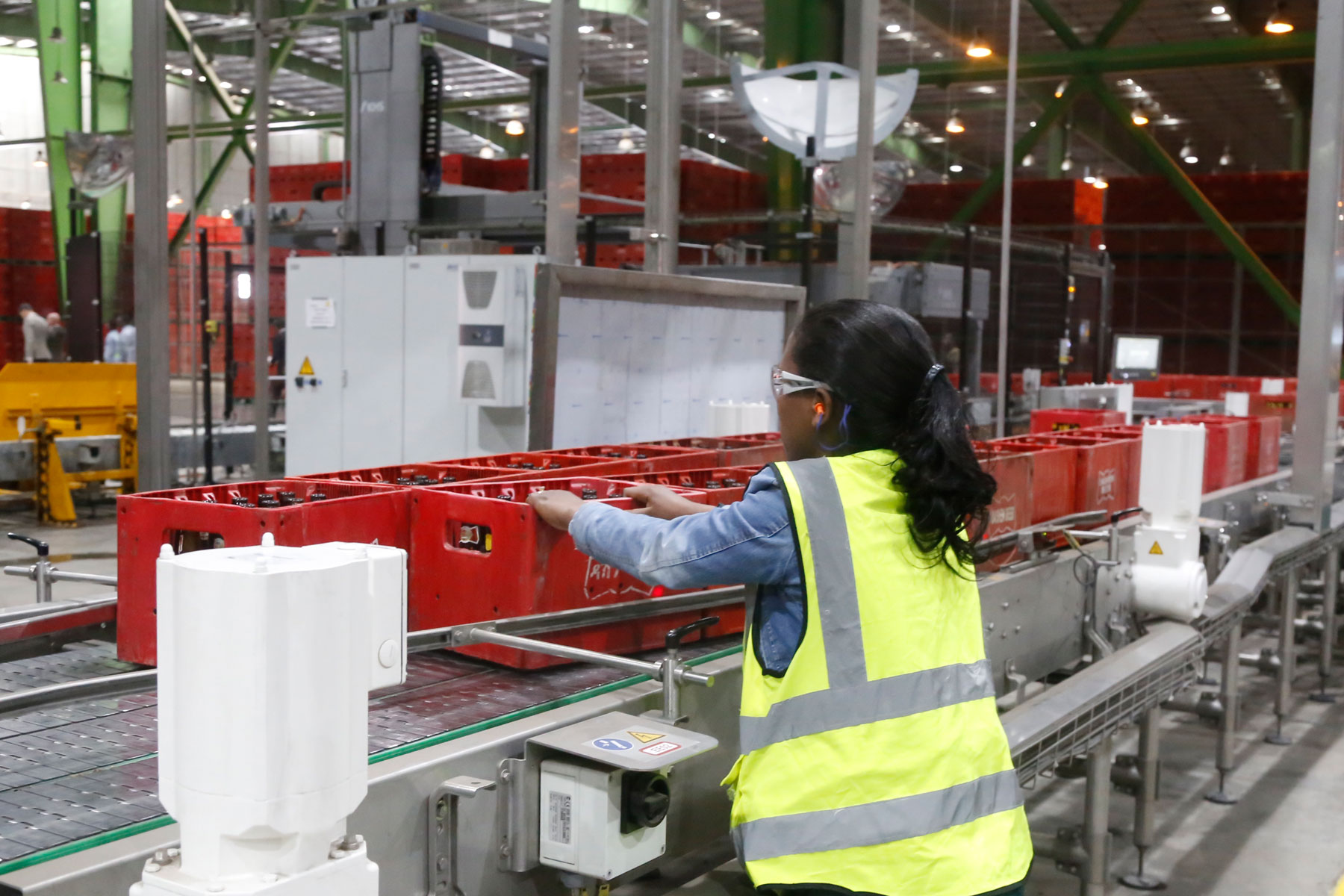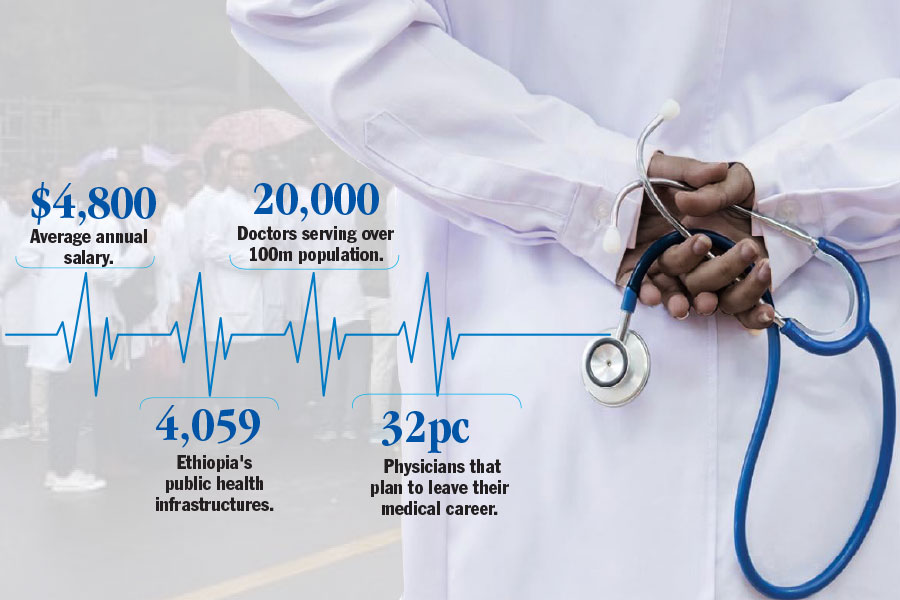
Fortune News | Apr 13,2024
Jan 3 , 2021
By Clay Webster
Instead of putting in place a complicated initiative by a government or industry association to recycle a greater percentage of the water bottles that are discarded, simply increasing the refund fee for returning collected bottles would do the trick, writes Clay Webster (complaintsandrecriminations@gmail.com), who studied energy and environmental policy at Johns Hopkins School of Advanced International Studies and has written about energy, commodity and financial markets for The Motley Fool, Plattsand US News & World Report.
One of the seemingly unsolvable byproducts of Ethiopia’s surging domestic investment in new water bottling companies is the plethora of discarded plastic bottles that litter roadsides and clog water drainage systems throughout urban areas. Many of these bottles travel out of urban places via waterways and pollute ecosystems further off in rural ones.
This is not an unknown issue. Governmental bodies have sounded the alarm and even put forth new initiatives to fight the scourge. A new group of private bottlers has even formed an association to raise funding for extensive recycling efforts.
But all this harping on solutions to the plastic bottle problem appears to have ignored the most obvious panacea – raising the refund fee for returned bottles.
As current policy stands, informal collectors – normally those unemployed by the formal sector – can stand to make a negligible fee for each kilogram of bottles they turn in to recycling centres. This policy allows for a certain amount of cleanup to happen naturally.
But as any observer can note on their own, there remains a surplus of uncollected bottles that make their way into rural areas far from recycling companies. These bottles either remain in the environment and leach chemical residue into the soil and waterways for centuries or make their way into landfills.
On the commercial side of things, recycling plastic bottles domestically also saves foreign currency that would otherwise be required to import the necessary petrochemicals.
Rather than concocting some government or industry initiative to recycle a slightly greater percentage of the total bottles, simply increasing the refund fee for returning collected bottles would do the trick all by itself. By adding a one or two Birr surtax to the retail price that would then go to pay for each bottle returned, a circular economy would be created wherein collecting bottles for a living would pay off handsomely.
A greater number of collectors would join the informal economy, driving down the number of discarded bottles, and the increased refund fee would compensate longer transport distances for returning the bottles to recycling facilities from rural communities. Additionally, an increased refund fee would flow to the income of informal collectors, most of whom make up the ranks of the unemployed poor. In this sense, the policy would double as an anti-poverty programme without costing the government budget any additional funds.
Of course, the water bottlers would likely lobby against such a tax, which would raise retail prices by 10 to 15pc. But the theory behind this type of tax system is nothing new.
British economist Arthur Pigou came up with his namesake Pigouvian tax a century ago. The reasoning behind them is that since commercial activities have always produced external costs on those other than the purchaser of certain goods, those costs must be added back in through tax policy to be paid by the buyer of the good.
In the present situation, the buyer of bottled water may discard the bottle in the environment once she is finished drinking it. The bottle costs present and future generations in terms of its ongoing pollution even though they did not benefit from drinking it. By placing the cost of pollution on the front-end user, Pigouvian taxes forces users to pre-pay for the future costs of their purchase.
Nations with this type of deposit refund scheme recycled between 80pc and 95pc of their plastic bottles, much higher than those without it, according to research by the UK Parliament’s Environmental Audit Committee in 2017.
But the refund amount is just as important. By increasing the recycled portion of the more than one billion plastic bottles that are produced here every year, Ethiopia will benefit from less plastic pollution, increase the incomes of the poor, and save scarce foreign currency for greater needs.
PUBLISHED ON
Jan 03,2021 [ VOL
21 , NO
1079]


Fortune News | Apr 13,2024

Radar | Nov 02,2019

Fortune News | Jun 17,2023

Commentaries | Feb 20,2021


Editorial | Aug 26,2023

Fortune News | Jun 21,2025

Editorial | Sep 11,2020

Viewpoints | Jun 15,2024

Exclusive Interviews | Jan 07,2024

Photo Gallery | 174125 Views | May 06,2019

Photo Gallery | 164347 Views | Apr 26,2019

Photo Gallery | 154470 Views | Oct 06,2021

My Opinion | 136631 Views | Aug 14,2021
Editorial | Oct 11,2025

Dec 22 , 2024 . By TIZITA SHEWAFERAW
Charged with transforming colossal state-owned enterprises into modern and competitiv...

Aug 18 , 2024 . By AKSAH ITALO
Although predictable Yonas Zerihun's job in the ride-hailing service is not immune to...

Jul 28 , 2024 . By TIZITA SHEWAFERAW
Unhabitual, perhaps too many, Samuel Gebreyohannes, 38, used to occasionally enjoy a couple of beers at breakfast. However, he recently swit...

Jul 13 , 2024 . By AKSAH ITALO
Investors who rely on tractors, trucks, and field vehicles for commuting, transporting commodities, and f...

Oct 11 , 2025
Ladislas Farago, a roving Associated Press (AP) correspondent, arrived in Ethiopia in...

Oct 4 , 2025
Eyob Tekalegn (PhD) had been in the Governor's chair for only weeks when, on Septembe...

Sep 27 , 2025
Four years into an experiment with “shock therapy” in education, the national moo...

Sep 20 , 2025
Getachew Reda's return to the national stage was always going to stir attention. Once...

Oct 12 , 2025
Tomato prices in Addis Abeba have surged to unprecedented levels, with retail stands charging between 85 Br and 140 Br a kilo, nearly triple...

Oct 12 , 2025 . By BEZAWIT HULUAGER
A sweeping change in the vehicle licensing system has tilted the scales in favour of electric vehicle (EV...

Oct 12 , 2025 . By NAHOM AYELE
A simmering dispute between the legal profession and the federal government is nearing a breaking point,...

Oct 12 , 2025 . By NAHOM AYELE
A violent storm that ripped through the flower belt of Bishoftu (Debreziet), 45Km east of the capital, in...